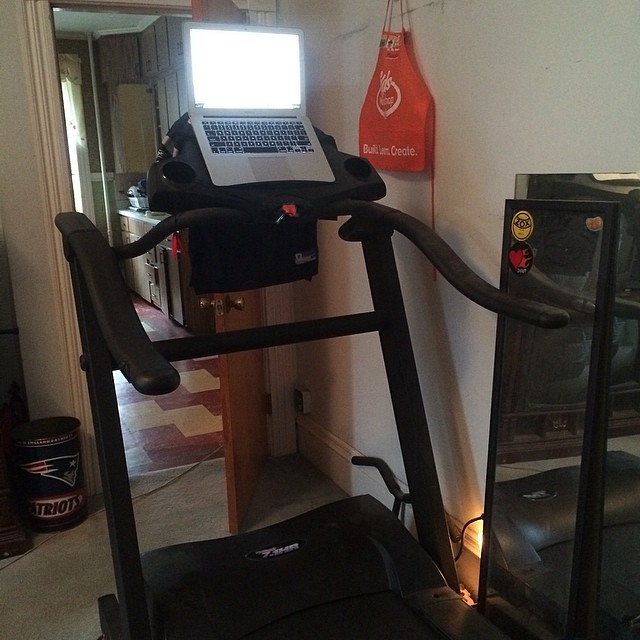This year we attended #SearchLove in Boston, an SEO conference from Distilled.
We’ve been slacking on the conference circuit because biz has been growing so fast the past few years, but I’m always endlessly thankful that I attended when I do register for one. SearchLove was no different.
Pat and I came back to the office totally jazzed about some of the things we learned, in particular how detailed you can get with content grouping in Google Analytics to learn how your content performs. Pat’s been hacking away at the tools provided to get us set up so our clients can get more in-depth data since we left. Here we are, morning 1!
Hanging at #searchlove today! #seo pic.twitter.com/WDDEVsToKa
— Lantern (@LanternContent) May 3, 2016
Now onto the take-aways.
1. Intent is the only thing that matters in SEO these days.
Don’t optimize for keywords you haven’t searched for yet. If you’re writing an article on “Aruba beaches,” for example. You’ll find that Google lists three beaches that bring you directly to maps. Below that, you’ll see a row of photos. Google is saying that they don’t think people are looking for a how-to article on finding the best beaches, the searcher wants directions or photos. In some cases, you may find that the top of the page is simply the photos. In my research since, I’ve found when this occurs, all of the top 10 posts below it are LOADED with photos. So when you see that, your article will need to have a ton of photos. You can derive your own logic from the other types of results that show up, but the strategy is clear: Google your dang keywords before you waste time writing about them. Also, if it shows local listings at the top, and you are not a local company, don’t even bother.
2. Use CPC Ads to test headlines for clickability.
One very common tip was to use AdWords as a way to test titles and meta descriptions. Sure you’ll run into character limits, but this is a super smart approach to testing headlines if you have the budget.
3. Start measuring the work.
As a Rand Fishkin fan since the beginning of SEOMoz, I was excited to hear him talk. You could say he was the major draw for me to this conference. One good take-away from his session was to measure the work, not the goal. For example, you could tell a content marketing team to raise traffic 30% in the next month, which provides them nothing to work with. Instead, you could tell them to write two extra Facebook posts per week, or start writing 1 extra blog post per week. Not only is that more useful direction, but it also allows you to test one thing at a time.
4. When guest blogging, be personal and pitch one person with your whole heart.
As we all know, guest blogging is one of the best ways to get high-quality inbound links. But unfortunately, companies get a lot of pitches. Britt Klontz from Distilled suggests pitching just one guest blog per month, and putting a lot of time into the pitch. Research the biz, read articles they’ve written recently, and be relevant and personal. Then, create an insanely resourceful post and get it shared. As Mary Bowling of Ignitor Digital said, “find out what the competitors are doing, and do it 10x better.”
5. How people engage on mobile is most important.
Will Critchlow from Distilled said, “Laptops are dummies.” People live on their phones, it’s the most personal device, and it knows the most about the user. It knows when they wake up, who they talk to, what their passwords are, and some even store payment info. People trust their phones and bring them along everywhere. If you’re not optimizing for mobile, you’re already late to the game. It’s time to start now.
6. Learn everything there is to know about content grouping.
Use Google Analytics as a simpler form of automated testing for content. You can learn things such as, how long are my best performing posts? Or, what kind of headlines are my best performing posts? Simo Ahava from Reaktor blew everyone’s dang minds with this session. If you didn’t get to attend the conference, read what he wrote about it back in 2014.
.@SimoAhava single-handedly putting all content reporting to shame w/ content grouping talk. #searchlove pic.twitter.com/VlHsGkX7XO
— Amanda MacArthur (@amaaanda) May 3, 2016
7. Good content wins.
I feel as if it’s so cliche to include this here, but…duh.
Before tackling any keyword, take the top 3 search results and send them to your writer so they can see who they’re up against. Motivate them to write something better. If they can’t, don’t tackle the keyword.
The most important ? to ask before creating content: why do you deserve to rank #1? Know why you're the best. @GregGifford #searchlove
— Amanda MacArthur (@amaaanda) May 3, 2016
8. Automate what can be automated.
When it comes to data, we are so hands on here at BuzzFarmers that analysts would laugh at us, but we just really like thinking deeply about things instead of letting a report tell us answers to questions we didn’t know to ask.
However, there’s plenty of room for automation. Paul Shapiro from Catalyst said, “anything that can be distilled into a process can be automated.” He said you could save 24-45 days every 5 years by automating using some of his favorite tools: Knime, GetStat, MarketMuse, SEMrush, and Moz. Google trends has an unofficial API for growth metrics, so you can compare one year of data to another year of data.
"Anything that can be distilled into a process can be automated." @fighto #searchlove pic.twitter.com/QonH3gxrOU
— Amanda MacArthur (@amaaanda) May 4, 2016
9. Google should basically buy HOUND, ASAP.
10. Stop being so literal with your cycle and boil it down to goals.
I loved the session by Mack Fogelson because we’re sorta kinda in the same niche, but I also felt like we’re SO on the same page about creating the best version of content you can, and making it useful to the consumer. She said, “Dove doesn’t sell soap, Dove wants to make feel women feel good about their bodies.” In other words, tackle the cultural problem you’re trying to solve, and what your brand is trying to do. Your product comes naturally afterward.
Exceptional user experience on every channel isn't a new goal, it's the status quo. @mackfogelson #searchlove pic.twitter.com/sbqeSfPd4E
— Amanda MacArthur (@amaaanda) May 4, 2016
11. Storytelling gets people to a CTA.
Another principle I bond strongly to is storytelling, and Kindra Hall’s session on storytelling not only demonstrated her ability to tell a story, but to get us all to the end. She quoted Rudyard Kipling, saying, “If history were taught in the form of stories, it would never be forgotten.” Then, she talked about how a headline such as “How Do French Girls Get So Pretty?” tells much of a story than something like, “Buy This Face Cream for 20% Off.”
12. Stories are about the nouns.
An introduction to an article without nouns, like people and places, forgets the story. Even articles that lead with quotes from famous people tend to do better in content. Kindra described how a story should go: Normal, EXPLOSION, new normal. It should not be: beginning, middle, end. Kindra said, “Most people start in the middle of the story— they start with what happened. You don’t know the “was” or “the struggle.” The news focuses on tragedies like fires and explosions and murder, but “nobody cries at the news because they don’t know the story.”
13. Fonts should be 13 pixels.
I was feeling nostalgic in a session by Justine Jordan from Litmus because I went to design school and enjoyed hearing words like leading, kerning and serifs again. But, one big take-away was that fonts on the web, in general should be 13 pixels because Apple devices will make them 13 anyway. Also, if you’ve ever used Lorem Ipsum in your design projects, you’ll find Bacon Ipsum is hilarious.
14. Find your donkeys and make them unicorns.
In the words of Larry Kim from Wordstream (another guy I was looking forward to learning from), “find out what your donkeys are.” Your donkeys are your articles with the lowest click-through rates. Find them, pick an emotion and make people feel it by writing 10 new headlines, and test them all on Adwords. Replace the donkey with the winner, a unicorn.

Of course there was plenty more to go around, but I can’t go spilling all the secrets now. I’ll be saving the rest for our clients!
Day one #SearchLove tackled. Gonna be dropping some serious knowledge when we get back to @buzzfarmers. pic.twitter.com/No5nfSng4q
— Amanda MacArthur (@amaaanda) May 3, 2016
Consider it dropped, my friends.



